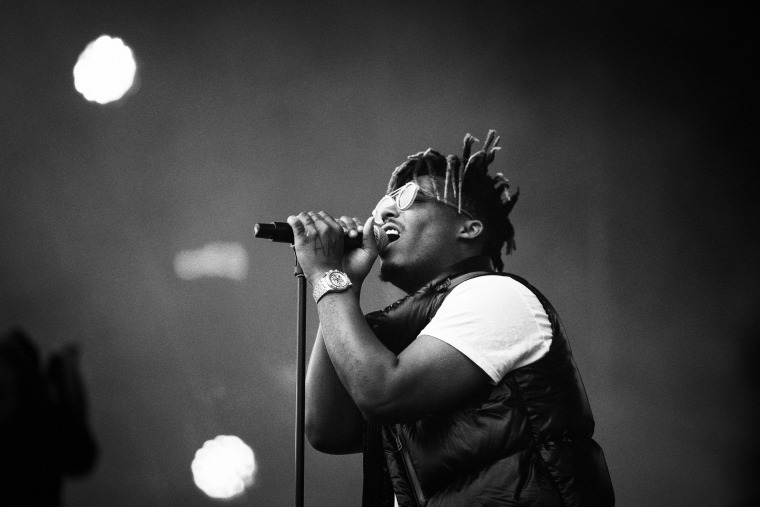One day, we will likely speak about the spate of deaths that has plagued the rap industry since late 2017 the same way we do now about the murders of Tupac, Biggie Smalls and Big L in the late ‘90s.
Mac Miller’s overdose, Nipsey Hussle’s murder in front of his own store, and the slow, lean-induced demise of Fredo Santana were each devastating losses. The most troubling development, though, has been the emerging trend of rappers dying as soon as they reach the legal drinking age. Over the weekend, emerging superstar Juice WRLD became the latest rapper aged 20 or 21 to die in the last two years. The "21 Club" is real. The question is: What are we going to do about it?
Over the weekend, emerging superstar Juice WRLD became the latest rapper aged 20 or 21 to die in the last two years.
In life, Juice WRLD was fixated on death. On “Lucid Dreams,” his 2018 break-out single that peaked at No. 2 on the Billboard Hot 100, he showed the world his fresh emotional scars in the aftermath of a traumatic breakup. “Thinking of you in my bed / You were my everything / Thoughts of a wedding ring / Now I'm just better off dead,” he sang in an affected pop-punk whine influenced by the likes of Fall Out Boy’s Patrick Stump.
The Chicago-born artist’s fluid, melodic sensibility and ability to write direct, high-stakes songs about angst, depression and drug addiction made him a readymade star at the intersection of rap and pop known as emo rap.
Juice WRLD died after reportedly suffering a seizure early Sunday at Chicago’s Midway Airport, just one week after his 21st birthday. Though the initial autopsy was inconclusive, TMZ reported that he swallowed "several unknown pills” before authorities searched his and his team’s bags. Police reportedly found 70 pounds of marijuana and six bottles of prescription codeine cough syrup on his private jet.
Juice’s massive fame, coupled with his lyrics that read plainly as cries for help, underscores the way that his death somehow felt simultaneously inevitable (or at least prophesied) and preventable.
Before Juice’s death, there was Lil Peep, who died at age 21 from an accidental overdose in 2017, and XXXTentacion (20) and Jimmy Wopo (21), who were shot dead on the same day in 2018. Juice foretold his own death in a tribute to Peep and XXXTentacion titled “Legends.” “What's the 27 club? We ain't making it past 21,” he sang. Then, later in that verse: “They tell me I’mma be a legend / don’t want that title now / ’Cause all the legends seem to die out.”
XXXTentacion died at 20, but his legacy is inextricably linked to those of Juice and Peep; they were three of the more important exponents of SoundCloud rap, the broadly defined genre that, in its most important recent iteration, integrates elements of emo and punk with rap. One defining quality of SoundCloud rap is that it is not merely an aesthetic or ethos, but also an essential music industry crutch; its greatest successes gestated on the platform for months or even years, cultivating massive fan bases, before attracting the longing gazes of major label scouts. And then, they crossed over into the mainstream. They made it. Until they didn’t.
Between 1969 and 1971, four of rock music’s brightest talents — Jimi Hendrix, Janis Joplin, Jim Morrison and Brian Jones — died suddenly at the age of 27, all from drug or alcohol-related causes. Ever since, their respective legacies have been colored by the odd coincidence that they all died at the same age, as well as the fact that later artists such as Jean-Michel Basquiat, Kurt Cobain and Amy Winehouse died at that age, too.
Juice, Peep, and XXX were generational mouthpieces, pop vanguards who had already achieved a global following.
The 21 Club doesn’t carry the same cultural weight as the 27 Club, but it might be one day. Juice, Peep and XXXTentacion were generational mouthpieces, pop vanguards who had already achieved a global following. While they all had various demons — XXXTentacion’s alleged domestic violence being the most controversial — they also shared much more in common than the far-flung constellation of 27 Club luminaries. They all wrote freely about mental health in a way that could verge on teen melodrama and they all possessed a considerable pop acumen that served as musical ballast. Their depressive music floated, and it resonated with millions.
Like the deaths of Joplin, Hendrix, Morrison and Jones, the deaths of Juice, Peep and XXXTentacion are the product of a specific time and drug culture, as well as much deeper social ills. If any institution is implicated here, it’s the music industry, which continually props up young artists without installing safeguards to protect their well-being or prepare them for the intense rigors of fame.
A parallel but very different kind of crisis is unfolding in South Korea, where systemic abuse and exploitation in the K-pop industry has been punctuated by the deaths by suicide of several prominent artists. It’s up to companies like Interscope, Juice WRLD’s label, to fundamentally rethink the way they work with and protect their young artists, even as they work to preserve Juice’s legacy in service of their bottom line.
Related:

